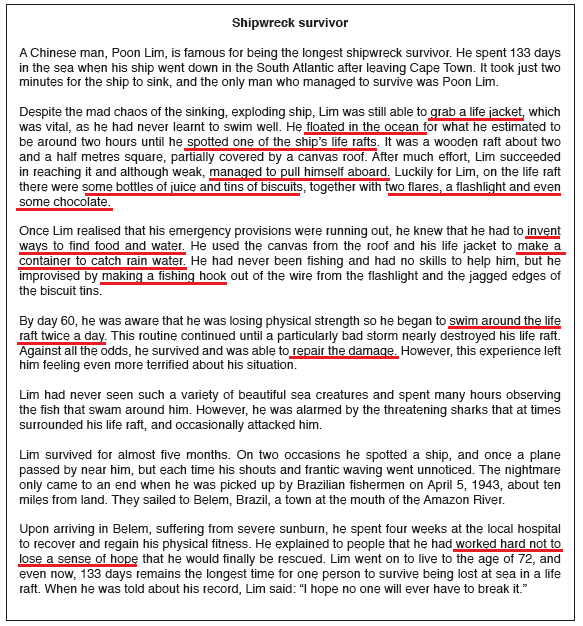Reading & Writing: Exercise 4 (Summary writing)
This is here it gets tricky for most people especially if summary writing in igcse format is a bit new to you, but like all igcse english second language exercises as long as you remember the correct format and the dos and don’ts, you’re guaranteed to score maximum marks
What is a summary? The formal definition is: a brief statement or account of the main points of something. And that’s exactly what you have to do. Identify the main, relevant points and write them in your own words in an organized manner. It’s a bit easier said than done at first though.
READ THE QUESTION PROPERLY AND UNDERLINE RELEVANT POINTS:
This is very crucial. You’ll usually be asked to summarise about a certain thing or event in the passage and not the hole passage so with that in mind you’ll need to carefully read the question and underlining or highlighting all the points in the passage that are relevant to it.


WRITE YOUR SUMMARY:
Now that you’ve identified all the points you’ll be writing on it’s time to write your summary. Before that there are a few things you’ll need to keep in mind.
. Write a one-line introduction that tells the examiner what you’re writing on briefly, in the passage above for example a suitable one-liner would be: Poon Lim, a ship wreck victim managed to astonishingly survive 133 days on an island by himself. Remember to keep it short
. Start organizing your points as you write, you can do it chronologically or problem solving, advantage-disadvantage format depending on the question and what you think would be most suitable.
. To make organizing your points easier and add a sense of continuity, use connectives
. Try to use your own words as much as possible, you can rely on synonyms of words in the passage to make it easier or you can twist the way a statement was delivered in the passage.
. Since the summary isn’t about summarising the whole passage a conclusion is not needed
. Stick to the word limit. Usually the word limit for is about 100-120 words so as you write keep track of how many words you’ve written to know if you need to write less or more.